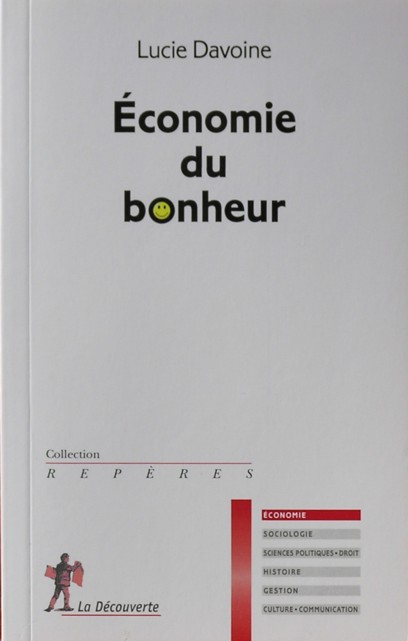

At the beginning of the 21-th century there was a flood of publications about happiness economics. Nevertheless it can not be said, that happiness economics has conquered a solid place within the economic science. It lacks a sufficient number of researchers, and furthermore agreement on the theoretical framework has not yet been obtained. Moreover, the experimental results are sometimes not very convincing for the relative outsider (like your reviewer). And the discipline is rather susceptible to unsound infringements by guru's, ideologists, and dreamers. Therefore it does not surprise that this discipline remains unpopular in many states. This is for instance true for France. It is gratifying that now yet the useful book Économie du bonheur has been published, written by Lucie Davoine.
Davoine herself is not active in research of happiness economics. Therefore her book does not contain new personal findings, but merely gives a summary of the present state of knowledge. Besides, the book is rather thin, with a little over hundred pages, a hallmark which is typical for many French pocket-book series. Nonetheless, Davoine suceeds in sketching a fairly complete picture, including various nuances. Definitely unique is on p.12-13 the extensive list of international surveys, which inquire about the individual happiness and well-being, in combination with various other personal data. Your reviewer certainly plans to use these data by means of the internet. The reference list of literature of 16 pages at the end of the book is also an excellent source of information.
The design of Économie du bonheur is well chosen. Each chapter discusses a separate theme of happiness economics. It starts with an explanation of the available methods. Next the individual utility of income is described. Fascinating as well is the theme of job satisfaction, and the theme of fluctuations in happiness during the course of life. In the last two chapters the meaning of national institutions and of state policies for well-being are analyzed. Davoine, who herself works in the administration, pays much attention to the practical consequences of happiness economics. For instance, the Americans are very satisfied with their belief in the American dream of upward mobility (p.79). It reinforces their productivity.
What did particularly strike your reviewer while reading Économie du bonheur? Davoine points out, that the surveys themselves stimulate the formation of theories. Since the eighties of the last century the number of surveys has increased, so that this perhaps explains the recent revival of happiness economics. Especially when surveys are regularly repeated in time, they can bring to light surprising effects. On the other hand, it is extremely difficult to design surveys in such a manner, that they do not a priori affect the answers. During the analysis the causal relation must be determined, that is to say, the cause and effect must be ordered correctly. Another unknown aspect is the influence of the national culture.
An often repeating aspect of Davoine is the discovery by Kahneman (or is it Van Praag?) that the decision utility differs from the experienced utility. In other words, individuals take insufficiently into account in their decisions the future processes of habituation and adaptation. A rise in welfare mainly causes a temporary increase in happiness. The individual situation is compared with a reference group, and preferably with those who are slightly more rich. The new welfare is soon played down. Therefore according to some guru's economic growth is meaningless, and also Davoine is sensitive to this argument (p.91 and further). Incidentally, the habituation rather depends on the theme. It is for instance relatively easy to adapt to a physical handicap, but less so to unemployment or a failed marriage. Thus economic growth leads to happiness, not just due to the wealth, but also due to employment (p.52)! On the other hand, the AIDS epidemy in Africa does not seem to affect happiness (p.66).
Happiness is obviously not everything. Thus Davoine concludes already on p.69 that individuals also desire meaning and ethics. However, personal morals can be irreconcilable with physical forms of pleasure. South-Americans derive much happiness from their religion (p.84). Here the question of the comparability (commensurability) of happiness rises. This is a theme beyond happiness economics, and Davoine does not address it further. Interesting is also, that thanks to happiness economics the midlife crisis has now scientifically been proved. It is located around the age of 45, and perhaps some years before, when the rising income is taken into account (p.71)1. In political decisions it turns out that not just the result is important for happiness, but the way of realizing the result as well (procedural happiness). Corrupt states make their population unhappy (p.80).
Davoine concludes with the statement, that apparently many ways lead to happiness2. According to your reviewer it does not hurt to also read this book on the way, and therefore a recommendation is justified. And although the scientific dry tone of the book is regrettable, this also means that the French dictionary is hardly needed.